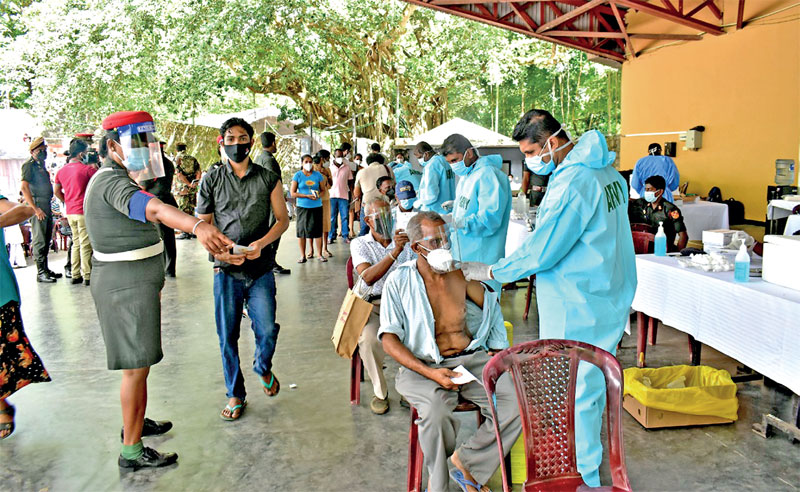Monday Feb 16, 2026
Monday Feb 16, 2026
Friday, 20 August 2021 00:14 - - {{hitsCtrl.values.hits}}

Sri Lanka has failed to control the pandemic effectively despite advantageous conditions
 Now Sri Lanka lies in a narrow plateau found before a great abyss on its way towards a greater crisis. If it is not saved from falling into the abyss, it is most likely to end up in a state of permanent paralysis that cannot be fully cured
Now Sri Lanka lies in a narrow plateau found before a great abyss on its way towards a greater crisis. If it is not saved from falling into the abyss, it is most likely to end up in a state of permanent paralysis that cannot be fully cured
The loss of critical intelligence to a great deal is an unavoidable occurrence in a crisis of this nature. On the other hand, it is due to the loss of critical intelligence that a country is most liable to end up in such a situation. The absurd manner in which the people and the rulers of the country have behaved and are behaving in facing the coronavirus pandemic shows the extent to which the level of critical intelligence of the country has declined.
Facing the pandemic
Sri Lanka has failed to control the pandemic effectively despite its advantageous conditions such as being an island nation, having a remarkably high level of literacy, and availability of an advanced and widespread healthcare system coupled with almost the entire population of the country having been administered with the BCG vaccination as soon after birth as possible.
The lead role of controlling the pandemic was entrusted to the security forces, not the health workers. Even when the vaccination program against coronavirus was initiated after abandoning the prominence given for unscientific practices like depending on chanted water (pirith pan) and Ayurvedic syrups, the recommendation of the World Health Organization (WHO) to give priority for the people over 60 years of age in administering the vaccine was not followed; instead the first priority was given to the people of the 30-50 age cohort. On account of this stupid policy, it can be said that a considerable number of people over the age of 60 had to pay with their lives.
As of 15 August, the number of deaths from COVID had been reported as 5,936, of which 74.7% were over 60 years of age, and more than half of them had not been vaccinated. Therefore, most of them can be considered to have died due to not giving priority to those above 60 years of age in administering the vaccine.
Discrepancies in COVID statistics
It has been brought to light that there has been a significant gap between the official statistics and the actual figures on the number of infected people and the deaths that occurred in the Gampaha District and the Eastern Province.
According to the revelations made at the meeting of the Gampaha District COVID Prevention Committee, the official number of infected cases for the period 1-9 August had been reported as 3,629 by the Government. According to the National Operation Centre for Prevention of COVID-19 Outbreaks (NOCPCO), it was 12,555. The difference is 8,926.
The Director of Health Services in the Eastern Province has stated that the official figures provided by the Government in respect of the number of infected people in the four districts of the Eastern Province are also incorrect. It seems that the Government is pursuing a policy that allows its cronies to make maximum profit from this pandemic.
How long will the corona pandemic last? What will be its death toll in Sri Lanka? There are projections prepared by various institutions in this regard. Regardless of the authenticity of these projections, the death toll could rise sharply if the safety of life of the people is not given priority over the country’s economic survival at a time when the pandemic is spreading fast.
At the same time, it can be presumed that, with a significant number of people in the country contracting the virus, and if not all, a larger portion of the population vaccinated will help boost the level of herd or community immunity as a possible way to contain the spread of COVID-19. This might eventually bring the spread of the virus under control, thereby weakening its ability to disrupt people’s lives. Until then, the country will be compelled to live with the virus.
After the pandemic
In the course of time when the significance attached to the pandemic is diminished, it can be said that the other crises such as the crisis of the socio-political system and that of the economic and balance of payments which have been overshadowed by the veil of the COVID pandemic will emerge. All these crises facing Sri Lanka are no longer possible to be postponed; they need to be resolved expeditiously.
The policy that Sri Lanka has pursued since independence has been to allow the crises to petrify and remain unresolved without addressing them in a timely manner as and when they arise. The current catastrophe and failure experienced in Sri Lanka can be seen as an inevitable outcome of this wrong policy.
Archbishop Malcolm Cardinal Ranjith has called on the people to hoist black flags across the country on 21 August as a protest against the failure to do justice to the victims of Easter attack on 21 April 2019.This shows the extent of fermentation of the ethnic and religious crisis that has been suppressed without a solution. The Tamil and Muslim crisis is also in a similar state. Now, in the final analysis, Sinhala Buddhists also feel that they have been deceived.
Sri Lanka was plunged into large-scale violent struggles and insurrections because of its failure to build the nation and address racial, caste and religious issues. However, though rather late, the Government was able to crush the resulting violent uprisings mercilessly.
But, the failure of the Government to bring about structural reforms to address the grievances underlying the insurrections and rectify the distortions in the State caused by them eventually resulted in the nature of the State being drastically changed, assuming a carnivorous and predatory character.
In the ensuing decline of the State, a vicious system was established in which the Heads of State used to employ the Government security forces for their narrow political gains and use them for heinous crimes. It was as a result of this situation that a series of mysteriously horrific crimes had taken place apart from the crimes committed by official criminals, insurgents or official security forces of the country
Mysterious crimes
Among the crimes committed in Sri Lanka there are some terrible crimes which have not been revealed yet and the culprits responsible identified and brought before the law. The assassinations of Lalith Athulathmudali and President Ranasinghe Premadasa fall into this category. Both killings have been credited to the LTTE account, but it has not been confirmed by a formal investigation.
Soon after the assassination of Premadasa, the site of crime was washed and cleared off. Bradman Weerakoon is of the view that the assassination of Premadasa was by no means an act of LTTE. My view is that both these leaders must have been assassinated by the same group affiliated to the State.
It appears that the suicide bomb attack at Town Hall in 1999 targeted at President Chandrika Bandaranaike Kumaratunga and the attack on Major General Lucky Algama at a political rally in Ja-Ela on the same day appear to have been carried out by the same group of people. The report submitted by DIG O.K. Hemachandra on the incident carries a similar narrative.
The DNA test confirmed that the two women who were produced before the courts who claimed to be the mother and sister of the female suicide bomber of the town hall bombing were impostors. Subsequent investigations conducted by the Yahapalana Government into a number of heinous crimes have confirmed the involvement of Government intelligence services.
Sri Lanka should investigate the heinous crimes which have not been uncovered yet. The people have the right to protest peacefully against such acts. In the final analysis, the sovereignty power lies with the people, not the rulers. If any ruling caucus in power acts contrary to the agreed policies, the people have the right to demand the rule of law and change the situation without simply waiting for the next election.
What Sri Lanka needs urgently is a program of structural reforms needed to recreate the socio-political system, the State and the economy which have reached a level of utter failure. The Government and the Opposition must prepare a frame for the public to achieve this objective. If the Government and the Opposition refuse to do that, the people themselves have the right to create such a framework adopting a policy that empowers the people.